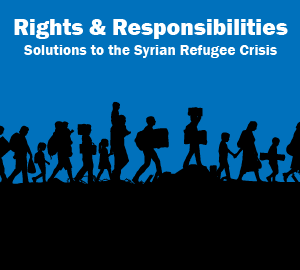 Almost every European leader passing through Washington uses the same phrase to describe the migrant crisis: “existential threat.” They mean fear that the European Union could disintegrate as a result of the political, economic, and humanitarian stress caused by the most massive transfer of populations since World War II.
Almost every European leader passing through Washington uses the same phrase to describe the migrant crisis: “existential threat.” They mean fear that the European Union could disintegrate as a result of the political, economic, and humanitarian stress caused by the most massive transfer of populations since World War II.
Hence the high-stakes deal reached between Brussels and Ankara in March. It was designed to stem the flow in part by sending back to Turkey the majority of those who arrive on Greece’s shores. More than two months later, fewer than 500 have been returned, not necessarily as a result of the new deal.
The effectiveness of the agreement depends on processing a large number of asylum claims quickly. The legitimacy of the agreement rides on doing so consistently and fairly. The international community can and should do more to make sure that the Greek administrators are able to do both.
More than 8,000 migrants have arrived in Greece since the deal was signed, but only a few hundred cases have been processed. Addressing the problem immediately is a humanitarian imperative, as well as a political one. Failure on the part of Greek authorities to process claims quickly, combined with border closures along key onward migration routes, have resulted in massive overcrowding at camps on the Aegean islands—the place where many refugees, from Syria and elsewhere, first reach Europe. As the situation grows dire, rioting and other acts of violence are becoming increasingly common.
Addressing the problem immediately is a humanitarian imperative, as well as a political one.
Taking swift action is also a political necessity. Bringing the flow of arrivals down to manageable levels is critical to keeping Europe’s borders open and its right-wing parties in check. That will only happen if the deal is seen to be working, since only then will it have a deterrent effect.
Processing claims fairly is just as important. The controversial deal has come under significant scrutiny from rights groups who fear that it constitutes collective expulsion, illegal under European law. As long as each individual case is handled separately, with options for appeal—as intended under the terms of the agreement—that particular criticism of the pact is hard to sustain. But it’s uncertain whether that the Greek administration has the capacity to pull off this daunting feat consistently in the face of chaos, while significantly under-resourced. According to a recent report by the Europe Bureau of the United Nations High Commissioner for Refugees (UNHCR), in April, thirteen asylum seekers were deported in error, having not been allowed to register their claims.
Unfair and inconsistent treatment puts a vulnerable population at even greater risk. It will also deter humanitarian groups, who provide critical on-the-ground assistance, from continuing to do so. UNHCR, Médecins Sans Frontières, and the International Rescue Committee, among others, have suspended some activities in refugee centers on the Greek islands because they do not want to be involved in what they describe as blanket expulsion. The scale of the challenge is so great that partnership between government and humanitarian aid organizations—especially those with substantial experience providing relief—is essential.
In light of what’s at stake, the international community should step up its capacity-building assistance to beleaguered administrators who are at the front line of the effort to manage a crisis that is both urgent and consequential. As part of the deal, Europe committed to helping Greece put in place the necessary human resources to carry out its operations. Yet as of June 10, not one of the promised readmission experts or judicial officials has been deployed. Of the nearly five hundred pledged asylum officials, less than one hundred have arrived. Europe must move quickly to fulfill those personnel commitments. The United States should look for ways to assist.
By doing so, the international community can make the deal more effective, as well as more humane. That’s in everyone’s interest.
The Brookings Institution is committed to quality, independence, and impact.
We are supported by a diverse array of funders. In line with our values and policies, each Brookings publication represents the sole views of its author(s).





Commentary
A pivotal moment for Europe
June 13, 2016